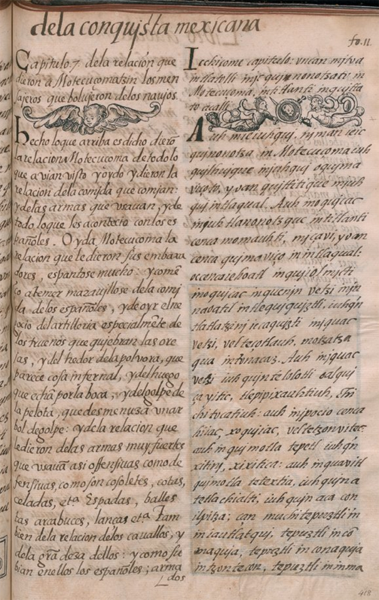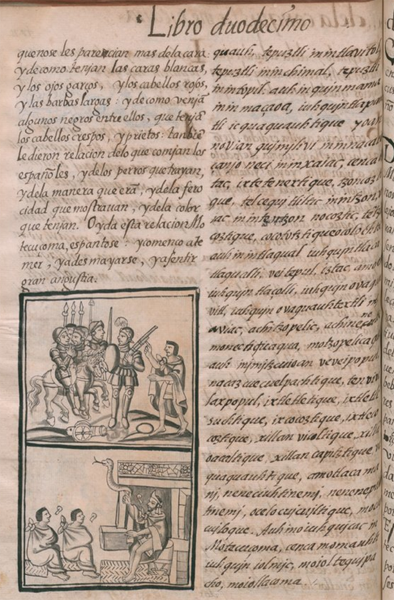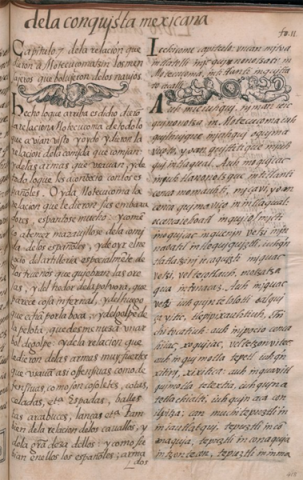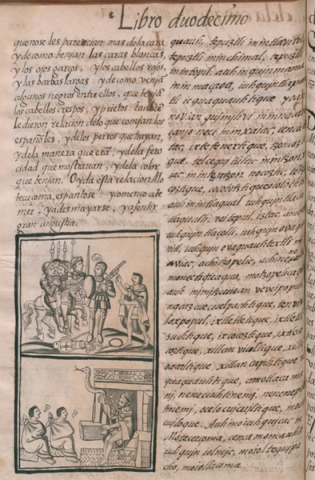 |
[Transcription of the Nahuatl (right-hand column) by James Lockhart:]
[f. 11r.] Ic chicome capitulo: vncan mitoa in tlatolli inicquinonotzato in Motecuçoma, in titlanti in quittato a-calli.
Auh in ie iuhqui, niman ie ic quinonotza in Motecuçoma iuh quilhuique in iuhqui oquimaviçoto, yoanquittitique in iuhqui intlaqual.
Auh in oquicac in iuh tlanonotzque in titlanti cencamomauhti, miçavi, yoan cenca quimaviço in intlaqual: oc cenca iehoatl in quiiolmicti in oquicac in quenin vetziin innaoatil* in tlequiquiztli, iuhq’n tlatlatzini ic caquiztiin iquac vetzi, vel teçotlauh, motzatzaqua in tonacaz. Auh in iquac vetzi iuhquin telolotli oalquiça yitic, tlepipixauhtiuh, chichitocatiuh: auh in ipocio cenca hiiac, xoquiiac, vel tetzonvitec: auh in quimotla tepetliuhq̓n xitini, xixitica: auh in quavitl quimotlatetextia,iuhquin atetlachialti, iuhquin aca conilpitza; çan muchi tepuztli** in iniautlatqui, tepuztli in cōmaquia, tepuztli in conaquia intzontecon, tepuztli in inma
----------
*INNAOATIL. Or "when they heard about the report of the guns," or "when they heard how the projectiles of the guns hit"?
**TEPUZTLI. Tepoztli, having referred to copper and perhaps to any usable nonprecious metal in preconquest times, quickly came to mean the ion (and steel) the Spaniards brought with them. If we are to imagine the messengers actually saying the things reported here, the meaning was probably simply "metal."
|
[Translation of the Nahuatl (right-hand column) by James Lockhart:]
Seventh chapter, where is told the account that the messengers who went to see the boat gave to Moteucçoma.
When this was done, they talked to Moteucçoma,telling him what they had beheld, and they showed him what [the Spaniards’] food was like.
And when he heard what the messengers reported, he was greatly afraid and taken aback, and he was amazed at their food. It especially made him faint when he heard how the guns went off at [the Spaniards’] command, sounding like thunder, causing people actually to swoon, blocking the ears. And when it went off, something like a ball came out from inside, and fire went showering and spitting out. And the smoke that came from it had a very foul stench, striking one in the face. And if they shot at a hill, it seemed to crumble and come apart. And it turned a tree to dust; it seemed to make it vanish, as though someone had conjured it away. Their war gear was all iron. They clothed their bodies in iron, they put iron on their heads, their swords were iron,
[Translation of the Spanish (left-hand column) by James Lockhart:]
Chapter Seven, of the account that the messengers returning from the ships gave to Moteucçoma.
When the above-said had been done, they gave account to Moteucçoma of everything they had seen and heard, and told of the food that they ate and the weapons they used, and of everything that happened to them with the Spaniards.
When Moteucçoma had heard the account that his ambassadors gave him, he was greatly shocked and began to be afraid. He marveled at the Spaniards' food and at hearing the business of the artillery, especially the thunderous sounds that burst the eardrums and the stench of the powder, which appears to be something infernal, and the fire that they hurl from the mouth, and the impact of the ball, which reduces a tree to shreds at one blow, and the account of the very strong weapons they used, offensive as well as defensive, such as cuirasses, coats of mail, visored helmets, etc., and swords, crossbows, harquebuses, lances, etc.
Also the account of the horses and of their great size, and how the Spaniards mounted them in armor,
|
[Translation of the Nahuatl into Spanish by Fr. Bernardino de Sahagún; transcription of the Spanish (left-hand column) by James Lockhart:]
[f. 11r.] Capitulo .7. de la relación que dieron a Motecuçomatzin los mensajeros que boluieron de los nauios.
Hecho lo que arriba es dicho dierō la relacion a Motecuçoma de todo lo que avian visto y oydo y dieron la relacion de la comida que comían: y de las armas que vsauan, y de todo lo que les acontecio con los españoles.
Oyda Motecuçoma la relacion que le dieron sus embaxadores, espantose mucho: y comēço a temer marauillose de la comida de los españoles, y de oyr el negocio del artilleria especialmēte de los truenos que quiebran las orejas, y del hedor de la polvora, que parece cosa infernal, y del huego que echā por la boca, y del golpe de la pelota, que desmenuza vn arbol de golpe: y de la relacion que le dieron de las armas muy fuertes que vsauā asi offensiuas como defensiuas, como son cosoletes, cotas, celadas, etª Espadas, ballestas arcabuces, lanças etª
Tambien de la relación de los cauallos, y de la grādeza dellos: y como subian en ellos los españoles, armados
|
 |
[Transcription of the Nahuatl (right-hand column) by James Lockhart:]
[f. 11v.] quauh, tepuztli in intlavitol, tepuztli in inchimal, tepuztli inintopil:
auh in quinmama in inmaçaoa, iuhquin tlapantli icquaquauhtique yoan novian quimilivi in innacaio, çanio neci in inxaiac, cenca iztac, ixtetenextique, tzoncoztique, tel cequi tliltic in intzon, viiac in intentzon no coztic, tētzōcoztique, cocototztique ocolochtic: auh inintlaqual iuhquin tlacatlaqualli,* veitepul, iztac, amo etic iuhquin tlaçolli, iuhquin ovaquavitl, iuhquin ovaquauhtextli inic aviac, achi tzopelic, achi nenecutic monecticaqua,** motzopelicaqua:
auh in imitzcuioan veveipopul, nacazcuecuelpachtique, tenvivilaxpopul, ixtletletique, ixtletlesuchtique, ixcocoztique, ixtlecocoztique, xillanvicoltique, xillāoacaltique, xillancapitztique vel quaquauhtique, amo tlacamani, neneciuhtinemi, nenenepilotinemi, ocelocuicuiltique, mocuicuiloque.
Auh in o iuh quicac in Motecuçoma, cenca momauhti iuhquin iolmic, moioltequipacho, moiollacoma./.
----------
*TLACATLAQUALLI. The dictionaries justify the translation "fasting food," but by its elements the construction could also mean "people's food."
**MONECTICAQUA. It appears that the manuscript originally had "monectiquaqua." The first qu was then written over in a fashion transforming it approximately into tic, leaving something that could be read as "monecticticaqua" or "monectiticaqua," but the intention was clearly what is given in the text here.
|
[Translation of the Nahuatl (right-hand column) by James Lockhart:]
their bows were iron, and their shields and lances were iron.
And their deer that carried them were as tall as the roof. And they wrapped their bodies all over; only their faces could be seen, very white. Their faces were the color of limestone and their hair yellow-reddish, though some had black hair. They had long beards, also yellow-reddish. [The hair of some] was tightly curled. And their food was like fasting food, very large, white, not heavy, like chaff, like dried maize stalks, as tasty as maize stalk flour, a bit sweet or honeyed, honeyed and sweet to eat.
And their dogs were huge creatures, with their ears folded over and their jowls dragging. They had burning eyes, eyes like coals, yellow and fiery. They had thin, gaunt, flanks with the rib lines showing; they were very tall. They did not keep quiet, they went about panting, with their tongues hanging down. They had spots like a jaguar’s, they were varicolored.
When Moteucçoma heard it, he was greatly afraid; he seemed to faint away, he grew concerned and disturbed.
[Translation of the Spanish (left-hand column) by James Lockhart:]
so that nothing but their faces could be seen, and how they had white faces, blue eyes, red hair, and long beards, and how some blacks came among them who had crisply curled dark hair. They also told him of what the Spaniards ate, and of the dogs they brought along and how they were, and of the ferocity they showed, and what color they were.
When Moteucçoma heard this account, he was shocked. He began to be afraid, to lose heart, to feel great anxiety.
|
[Translation of the Nahuatl into Spanish by Fr. Bernardino de Sahagún; transcription of the Spanish (left-hand column) by James Lockhart:]
[f. 11v.] que no se les parecían mas de la cara: y de como tenian las caras blancas, y los ojos garços, y los cabellos rosos, y las barbas largas: y de como veniā algunos negros entre ellos, que teniā los cabellos crespos, y prietos: tanbiē le dieron relacion de lo que comian los españoles, y de los perros que trayan, y de la manera que erā, y de la ferocidad que mostrauan, y de la color que tenian.
Oyda esta relacion Motecuçoma, espantose: y començo a temer, y a desmayarse, y a sentir gran angustia.
|



